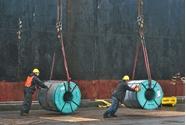Prices

January 27, 2018
When Protectionism is Not About Protecting America at All
Written by John Packard
The following article was written by George F. Will as an opinion piece in the Washington Post. It was originally published on Jan. 26, 2018.
Like Horatius at the bridge, or the boy who stood on the burning deck whence all but he had fled, or the Dutch boy who saved the city by putting his finger in the dike — pick your analogous heroism — the Trump administration acted this last week to stanch the flood of foreign-made washing machines that are being imported because Americans want them. The stanching will be accomplished by quotas and stiff (up to 50 percent) tariffs, which are taxes collected at the border and paid by U.S. consumers. Americans also will pay higher prices for washing machines made domestically by Whirlpool, which sought this protectionism, from which it instantly profited: In Monday’s after-hours trading, Whirlpool’s stock rose 3 percent. When protectionism is rampant, no bad deed goes unrewarded.
The washing machine drama about “putting (a faction of) America first” cannot be industrial policy — government rather than the market picking winners and losers. And it cannot be government redistribution of wealth. And it cannot be crony capitalism. It cannot be those things, because Republicans oppose those things and control policymaking.
Next, and soon, will come a government decision about the problem, as our protectors see it, of menacingly inexpensive steel imports, concerning which the administration is pretending to deliberate. The charade of thinking will end with the imposition of yet more steel tariffs/taxes, joining the 149 (some as high as 266 percent) already targeting many of the more than 110 countries and territories from which the United States imports steel. Twenty-four of the existing duties target Chinese steel, which is less than 3 percent of U.S. steel imports. America’s supposedly embattled steel industry is producing more than it did during World War II, and every year in this decade more than 10 percent of U.S.-made steel goods has been exported.
Imposition of the new tariffs/taxes will be done solely by the president, exercising discretion granted to presidents by various laws, including one passed in December 1974, when Congress evidently thought that Watergate, then fresh in memory, had taught that presidents were not sufficiently imperial. Then, as now, Congress seemed to think it had more important things to do than set trade policy.
In his new book “Clashing Over Commerce,” Dartmouth economist Douglas A. Irwin explains that the steel industry was a powerful advocate of protectionism until the 1892 opening of Minnesota’s Mesabi iron ore range, which gave steel producers cost advantages that turned their attention to export markets. The industry’s trade problems began when, in July 1959, the United Steelworkers shut domestic steel production down for 116 days — the longest industrial strike in U.S. history — and steel-consuming industries found alternative suppliers and materials. Desperate management purchased labor peace with increased wages that by the 1980s were 95 percent higher than the average in manufacturing, and soon U.S. steel was priced out of foreign markets. Intermittently since then, the industry has sought and received protection.
President Trump imposed tariffs on imported residential washing machines and solar powered products on Jan. 23. (The Washington Post)
In 2002, President George W. Bush imposed tariffs that caused steel prices to surge, costing more jobs in steel-using industries than then existed in steel-making. (Today there are upward of seven times more steel-using than steel-making jobs.) The tariffs cost $400,000 a year for every steel-making job saved, and cost $4 billion in lost wages. Especially hard hit in 2002 were three states — Ohio, Michigan, Pennsylvania — that in 2016 voted for today’s protectionist president.
In June, Commerce Secretary Wilbur Ross, who became a billionaire by plunging into the steel industry simultaneously with Bush offering it succor, said that “since we are the world’s largest importer of steel, we’re the main victim of the overcapacity” in the global steel industry. This puzzled George Mason University’s Don Boudreaux, who wondered “just how our being the world’s largest buyer of steel makes us victims of the alleged overcapacity.”
Fomenting spurious anxieties about national security is the first refuge of rent-seeking scoundrels who tart up their protectionism as patriotism when they inveigle government into lining their pockets with money extracted from their fellow citizens. Sugar producers are ludicrously protected in the name of “food security.” Most U.S. steel imports come from four important allies: Canada, South Korea, Mexico and Brazil. The coming steel tariffs/taxes will mean that defense dollars will buy fewer ships, tanks and armored vehicles, just as the trillion infrastructure dollars the administration talks about will buy fewer bridges and other steel-using projects. As Henry George said, with protectionism a nation does to itself in peacetime what an enemy tries to do to it in war.







